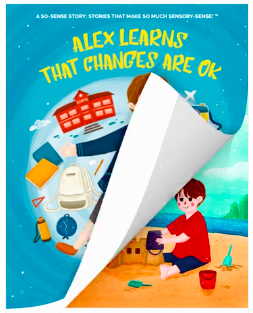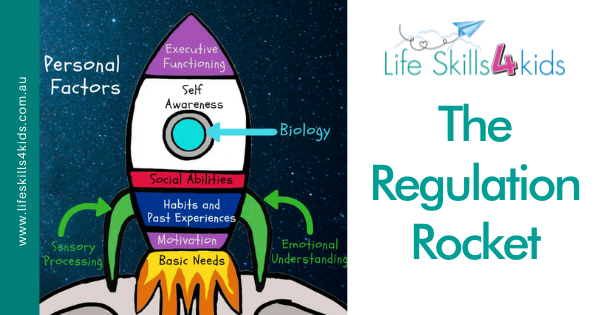By Simone Ryan – Occupational Therapist – talking about regulation.
One of the most common requests I’ve had when working with families and educators of children (with or without a disability or delay) is for assistance with a child’s self regulation. When we think of how important social emotional development is to school success, initiating and maintaining friendships, and a child’s home life, it’s not a surprise that this is a priority for many families and educators.
‘Self regulation’ is commonly defined as a person’s ability to maintain a state of alertness and arousal appropriate for a given situation. This may look like being able to sit and listen to a teacher read a story, engage in physical games with peers such as chasey, or going to sleep within a reasonable timeframe. When I looked across the vast amount of research and publications regarding the development of self regulation, it was clear there are many factors involved. I decided to create a visual and write a series of posts to help parents, families, caregivers, teachers or people working with children to:
- Understand how regulation develops or changes in response to the environment (including the presence and quality of social and caregiver supports)
- Learn the goal of self regulation is to engage in occupations, whether they be wanted, needed or expected.
- Discover that regulation needs (personal factors) differ depending on occupational requirements
So what influences our self regulation?
I say “our” because I find it helpful to think of your own self regulation when trying to understand the various factors that may be impacting on a child’s regulation development. If we can understand what factors influence our own ability to self regulate, or contribute to those moments where we as adults find it difficult to remain at optimal alertness and arousal, then we can better understand those we are striving to support. When reading about the different factors listed, think about how each of these impact on your self regulation. Do they help you self regulate? Or do they hinder? Do you have to actively manage factors or have you learnt how to manage your self regulation without much thought?
Self regulation is a skill we learn and develop over the course of our lifetime, and is taught through our interactions with others, namely our caregivers. This is called ‘co-regulation’: the support we get from another person, when they alter their responses in accordance to our behaviour. Coregulation is the most important environmental factor impacting on self regulation development. It is part of the social environment, which also includes extended social supports, socioeconomic status and social role expectations. Other environmental factors include the physical (built or natural) and cultural environment of an individual.
Looking at The Regulation Rocket, environment is the land that the Rocket is built on. If it is crumbly and infertile, the Rocket will struggle to be well built or to ever take off. Even if a well built Rocket is placed in an environment that does not support it, it will cause damage, limiting the ability to reach occupations.
The planets in The Regulation Rocket visual symbolise the different ‘reasons’ we engage in occupations (or activities of daily life). These include what a person wants, needs or is expected to do (WFOT, 2012). Occupational therapists break occupations down into three main categories: self-care (the things you need to do to look after yourself such as eat, clean and dress yourself, go to the toilet etc), productivity (activities in the house or community such as working, going to school, housework, caring roles etc) and leisure (the things you want to do such as play, recreational activities, hobbies etc).
While the visual displays just 3 planets, we can imagine there are endless planets, each representing a specific occupation. Which planets are “reachable” depends on the structure of an individual’s Rocket. Sometimes, we may need to alter the environment to allow a person to have the Rocket they need to reach a particular planet. This may mean changing social supports given to address specific personal factors, or altering the physical environment to support rather than damage a particular Rocket piece. Other times, we may help an individual reach a planet that is different to the one original aimed for yet still meets the purpose of travel. Some examples:
- Verbalising how you are feeling for a child who is still developing their emotional understanding, so they don’t have to rely solely on interpreting non verbal cues.
- Reducing auditory input for an individual who feels overwhelmed in noisy environments
- Simplifying an obstacle course for a child who is still learning how to motor plan.
Self regulation development is also influenced by a variety of personal factors. As I mentioned before, these personal factors (or pieces of the Rocket) are both supported or impacted by an individual’s environment. The types of occupations to be successfully engaged in will depend on these factors:
- Biology
- Self Awareness
- Executive Functioning
- Sensory Processing
- Social Abilities
- Emotional Understanding
- Basic Needs
- Habits, Beliefs and Past Experiences
- Motivation
A person’s self regulation is fluid. It will change depending on the environment and occupation being engaged in, as well as the influence of the personal factors at any point in time. Each of these factors can be specifically supported in order for an individual to develop self regulation skills and engage in meaningful occupations.
Thanks Simone for sharing your blog with us! Simone’s web-based planet is www.rocketot.com.
For more information, check out these blogs by Deb Hopper –
ALEX LEARNS FLIPBOOK
Alex loves school. He enjoys all the activities he does during the term such as swimming and soccer. He also loves holidays and all the fun things he gets to do while he’s not at school. The problem is, Alex doesn’t like changes. His tummy gets all tight and he gets a worry cloud that comes over his brain and makes it feel foggy. When the school term ends and holidays begin or when school is about to start again, Alex feels really worried and anxious.
When you purchase the Alex Learns that Changes are OK (Flipbook), you will receive a digital flipbook that gradually changes from one page to the next while listening to high-quality audio narration as if someone is flipping and reading the book for you!


